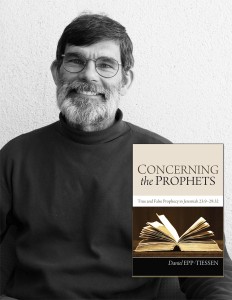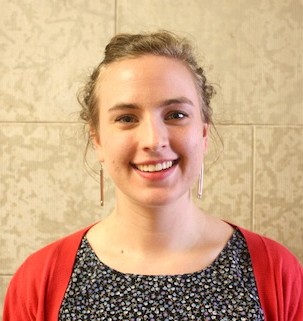In the last two days I’ve bumped into two worthwhile stories about millenials (18-30 year olds). One story was referred to me by a friend from the Winnipeg Free Press that addresses the changing landscape of journalism as Generation Y enters professional communication roles: Generation Y making over media. The second story was delivered in a RoundTable discussion here at CMU by sociologist James Penner as he shared his recent findings on Hemorrhaging Faith, a journey in (and out of) faith by youth and young adults in Canada. Both of these stories are pushing me to consider the style and substance of my own interests in creative media that is faith-affirming.
Winnipeg, April 5, 2013 – CMU faculty member Dan Epp-Tiessen has released his book, Concerning the Prophets: True and False Prophecy in Jeremiah 23:9-29:32 (Pickwick Publications), which “sheds light on the compositional history, structure, and theology of the book of Jeremiah by demonstrating that a large concentric unit of material focusing on true and false prophecy stands at the center of the book.”
“In a nutshell, false prophecy overlooks community sin, encourages complacency, prevents repentance, and leads to utter catastrophe,” says author Epp-Tiessen, Associate Professor of Bible at CMU. “True prophecy diagnoses the sins of the community, calls for repentance, and asserts that health and healing can only result from following God’s way of life.”
 Epp-Tiessen, who holds a Ph.D. in Old Testament from the University of St. Michael’s College (1994), has authored numerous articles, book reviews, curricula, and study guides, including Faith and Hope in the Midst of Changing Times, a five-week worship, prayer, and study guide commissioned by Mennonite Church Canada (2010). He has been teaching at CMU/CMBC since 1998.
Epp-Tiessen, who holds a Ph.D. in Old Testament from the University of St. Michael’s College (1994), has authored numerous articles, book reviews, curricula, and study guides, including Faith and Hope in the Midst of Changing Times, a five-week worship, prayer, and study guide commissioned by Mennonite Church Canada (2010). He has been teaching at CMU/CMBC since 1998.
Louis Stulman, Ph.D., of the University of Findlay praises as “intelligent, bold, and replete with exegetical insight. It will no doubt enrich all those interested in prophetic literature and the tortuous question of true and false prophecy.”
The fall 2012 release of Concerning the Prophets adds to CMU’s impressive body of works published since early 2012, which includes nine books, 13 book chapters, and 23 journal articles from a 45-member faculty.
“Scholarship lies at the very heart of CMU,” said Earl Davey, CMU’s Vice-President, Academic at the December 2012 book launch event. “I am confident to say we do well at forging an authentic and vital interface between scholarship and the teaching and mentoring process. Students are enriched as a consequence of our ongoing intellectual and spiritual work of analyzing and interpreting, constructing new ways of seeing and understanding the academic worlds we inhabit, and enabling us to discover more productive and informed ways of connecting with these worlds.”
At the book launch, Epp-Tiessen read his favourite sentence in the book the dedication: “To Esther, Chris, Tim, Mark, and Melissa, whose love and laughter nourish my scholarly work, and also place it in proper perspective.”
To order a copy of Concerning the Prophets, visit https://wipfandstock.com.
Winnipeg, April 3, 2013 – The eighth annual Verna Mae Janzen Music Competition at Canadian Mennonite University featured 24 competitors at its preliminary round of competition—the competition’s biggest year yet.

“It is incredibly exciting to see students’ strong musical abilities and the results of their many hours of musical practice and dedication this competition highlights,” says Janet Brenneman, Dean of the CMU School of Music. “The Verna Mae Janzen Music Competition is an excellent performance opportunity for our students. We are grateful for the generosity of Peter Janzen in establishing this competition.”
Out of 24 initial competitors, eight students progressed to the final round of the competition. Those students were Josiah Brubacher, Kari Chastko, Stephanie Crampton, Rebecca Klassen-Wiebe, Catherine Richard, Jami Reimer, Jillian Reimer and Nathan Sawatzky-Dyck.
Catherine Richard, a second-year pianist, was awarded $700 and first place in the competition. Kari Chastko, a forth-year voice student, placed second and received $500. Jillian Reimer, also a second-year pianist, came in third. She was awarded $300. All finalists are to be congratulated on their excellent performance at the final competition.
About 125 people attended the Verna Mae Janzen Music competition this year, held on March 21 at the Laudamus Auditorium. The competition is made possible by Peter Janzen of Deep River, Ontario, and named in memory of his wife, Verna Mae, who died of cancer in 1989 at age 53.
March 27, 2013 – In June, 2011, the Souris River—which divides the city of Minot, North Dakota in half—experienced record flooding. More than four thousand homes were destroyed in a disaster that displaced 12,000 people. On Saturday, February 17, eight Canadian Mennonite University (CMU) students as well as two staff, Sandra Loeppky and Rick Unger, left for North Dakota. Instead of relaxing, catching up on classes, or spending time with their families, the volunteers were willing to spend their reading break working in the community.

The students are being sent to Minot to help with the large-scale, multi-year MDS response to the flood, which is currently in its second year. CMU students were also sent out last year, and it is clear that their efforts made a difference. “In an interesting twist, we slept in the church that we helped build last year, on beds and bunks that we helped move,” says Sandra Loeppky, Coordinator of Commuter, Disability, and International Programs who helped plan both trips.
This year marked the first time in a while that Witness Through Service, a CMU Student Council Committee, was involved with the planning. Both of the leaders of the group, Christie Bueckert and Arlana Muller, joined the team in Minot this year. The committee helped with the organizing as well as the promotion of the trip. Bueckert says that she really enjoyed the experience because of the people she met in the community as well as the change of pace from the more mental work of school.
Students this year were involved in the construction of multiple homes, and worked in various roles, from painting to insulating to helping finish up drywall. At the end of the week, they were involved in a house dedication at the end of the week, giving the house they helped build to a couple, their daughter, and the daughters’ three children who lived with them. “Our students were asked to lead the singing for the dedication,” Loeppky says, calling the experience very touching.
Desiree Penner is a first year student at CMU. Recounting her experience, she said that “the hands on time spent repairing the homes affected by the flood was very worthwhile, but on top of that, I made amazing new life-long friends.” She was working on the team that helped repair the basement in a home. Desiree emphasized that she would love to go on the trip again next year. “It was definitely an experience that everyone should put on their bucket list!”

(Via Canada’s Economic Action Plan News Release)
WINNIPEG, MANITOBA – Today, the Honourable Steven Fletcher, Minister of State (Transport) and Member of Parliament for Charleswood—St. James—Assiniboia, on behalf of the Honourable Lynne Yelich, Minister of State for Western Economic Diversification, announced support for Canadian Mennonite University (CMU) under the Harper Government’s Community Infrastructure Improvement Fund (CIIF).

“I am proud to see Canadian Mennonite University benefit from our Government’s support for local infrastructure,” said Minister Fletcher. “Investments such as this highlight our Government’s commitment to create jobs, growth and long-term prosperity of Winnipeg and all Canadian communities for many years to come.”
The Harper Government’s investment of $8,262 has allowed Canadian Mennonite University to resurface the flooring in its gymnasium. The renovations are not only benefitting CMU students, but also over 40 community groups who use this highly-booked recreational venue in south-west Winnipeg.
“Canadian Mennonite University (CMU) acknowledges the critical role that student athletic involvement plays in building character, community and engagement within our university life,” said Terry Schellenberg, CMU Vice President, External. “We are deeply grateful for the funding provided through the Federal Government’s Community Infrastructure Improvement Fund to enhance our athletic facilities. A refurbished gymnasium floor will be of immense benefit to our students and the many teams and groups from the broader community who use our athletic facilities.”
In Economic Action Plan 2012, the Harper Government announced further support to help communities across the country modernize their infrastructure. Our Government committed $150 million over two years for the Fund. The Fund supports projects that look to improve existing community infrastructure accessible for use by the public, such as community centres, recreational buildings, local arenas, cultural and other community facilities.
Since 2006, the Harper Government, through WD, has invested in job-creating, small- and medium-sized businesses, aerospace, marine and defence industries, and supported innovative entrepreneurs in pursuing emerging markets. By continuing to promote new economic opportunities, WD is helping to create jobs, economic growth, and long-term prosperity.
Radio still relevant
A friend of mine in the communications business sent me a note about radio. For anyone who has ears, this information about radio is worth sharing.
“February 13 was the second annual World Radio Day (sponsored by UNESCO. It was created to promote worldwide access to information and freedom of expression over airwaves.
An article on Mashable (http://mashable.com/2013/02/13/radio-in-the-digital-age/) on the occasion of World Radio Day says the following about this medium.”
+++++++
From Mashable…
Despite the evolution of high-speed Internet and television’s prevalence in today’s culture, radio is still a very important and relevant medium — especially in developing nations. World Radio Day reminds us not only that digital hasn’t “killed the radio star,” so to speak, but also that radio can help drive change around the world.
Below, we’ve compiled five intriguing facts about global radio use that may surprise you.
1. 95% of the World’s Population Uses Radio
According to UNESCO, more than 95% of the world’s population uses radio. That high figure probably says it all, but to put it in even more perspective, this is compared to roughly one-third of the global population having access to Internet at all (let alone reliable or high-speed connections).
2. Most Households in Developing Nations Have Radio
As of 2010, at least 75% of households in developing countries have access to a radio, while only 20.5% of households in developing nations have access to the Internet.
As a result, radio can reach the most isolated communities (which includes many Native American populations in the U.S.), in addition to the poorest, where Internet cannot.
3. Radio Is the Only News Medium on the Rise in Russia Since 2008
Besides radio, all traditional forms of news media in Russia are in decline — even in Moscow, where there is an advanced print media market. The average monthly adult readership for daily newspapers decreased by 3.1% between 2006 and 2010.
Daily radio audiences, on the other hand, have risen 4% since 2008.
4. Radio Signals Are More Reliable
Certain geographical features affect the way countries receive information. For example, in rural areas of the Philippines, mountains get in the way of TV signals, but not radio communications. Radio reaches 85% of the entire country, while TV reaches just under 60%. As a result, radio is considered the most reliable medium for distributing news in the Philippines’ rural interior.
5. AM/FM Still More Popular Than Online Streaming
American adults listen to eight times more AM/FM radio than satellite radio, and 17 times more than Internet audio streaming. It will be interesting to see how these numbers change as innovation in the space increases.

This video features Rebecca Hill (CMU ’12) at In Gratitude, April 21, 2012, a CMU graduation weekend event at which class members share their experiences through spoken word or musical performance. Hill, soprano, performs with Catherine Richard, piano. The event brings together family members, graduates, students, faculty, and staff.
Note of correction : The order of songs performed is Healy Willan – Ae fond kiss, followed by Puccini – Quando m’en vo soletta.
Rebecca Hill
Bachelor of Music
Concentrations: Music Education-Early/Middle Years
Video Production: Laura Tait and Thomas Krause, CMU Communications & Media Students (2012)

This video features Paul Peters (CMU ’12) at In Gratitude, April 21, 2012, a CMU graduation weekend event at which class members share their experiences through spoken word or musical performance. The event brings together family members, graduates, students, faculty, and staff.
Paul Peters
Bachelor of Arts, 3-Year
Major: International Development Studies
Video Production: Laura Tait and Thomas Krause, CMU Communications & Media Students (2012)

This video features Melanie Kampen (CMU ’12) at In Gratitude, April 21, 2012, a CMU graduation weekend event at which class members share their experiences through spoken word or musical performance. The event brings together family members, graduates, students, faculty, and staff.
Melanie Kampen
Bachelor of Arts Honours, 4-Year
Major: Biblical and Theological Studies
Video Production: Laura Tait and Thomas Krause, CMU Communications & Media Students (2012)

This video features Anna-Marie Janzen (CMU ’12) at In Gratitude, April 21, 2012, a CMU graduation weekend event at which class members share their experiences through spoken word or musical performance. The event brings together family members, graduates, students, faculty, and staff.
Anna-Marie Janzen
Bachelor of Arts, 4-Year
Major: Peace and Conflict Transformation Studies
Video Production: Laura Tait and Thomas Krause, CMU Communications & Media Students (2012)
